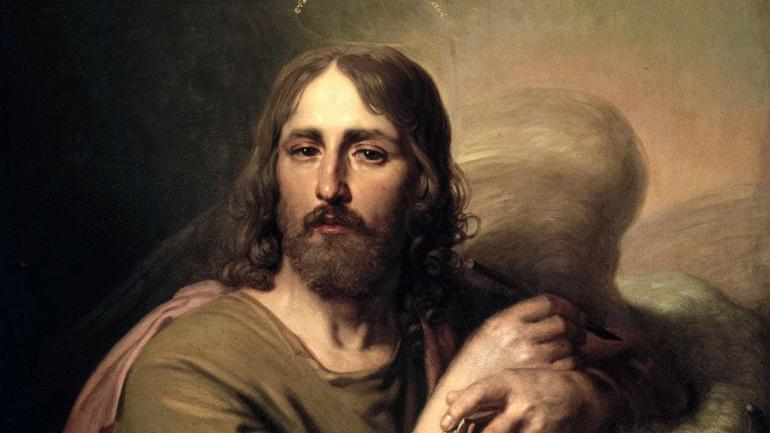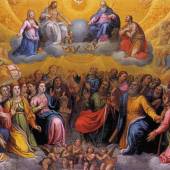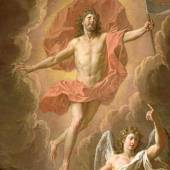St. Luke the Evangelist -- patron of physicians and surgeons

October 18, Monday, 29th Week in Ordinary Time
2 Timothy 4:10-17 & Luke 10:1-9
Luke, who wrote the Gospel and Acts of the Apostles, has been identified as the beloved physician (Colossians 4:14). It is believed that Luke was born a Greek and a Gentile. In Colossians 4: 10 - 14, St. Paul speaks of those friends who are with him. He first mentions all those "of the circumcision" i.e., Jews. He does not include Luke in this group.
Luke's Gospel shows special sensitivity to evangelizing the Gentiles. It is only in his Gospel that we hear the parable of the Good Samaritan, also Jesus praising the faith of Gentiles such as the widow of Zarephath and Naaman the Syrian (Luke 4:25-27), and the story of the one grateful leper who is a Samaritan (Luke 17: 11 - 19).
According to the early Church historian Eusebius, Luke was born at Antioch in Syria. In Philippians 1: 24, Luke is shown as a companion to Paul and in 2 Timothy 4: 1,1 in the prison he gave company to Paul.
Not only do we have Paul's word, but Eusebius, Saint Jerome, Saint Irenaeus, and Caius, a second-century writer, all refer to Luke as a physician.
The story of the Acts is written in the third person, as a historian recording facts, up until the sixteenth chapter. In Acts 16:8-9, we hear of Paul's company "so, passing by Mysia, they went down to Troas.
Paul had a vision during the night: there stood a man of Macedonia pleading with him and saying, 'Come over to Macedonia and help us.' "Then suddenly in 16:10, "they" become "we." "When he had seen the vision, we immediately tried to cross over to Macedonia, being convinced that God had called us to proclaim the good news to them."
In Acts 20:5, the shift to "we" tells us that Luke has left Philippi to rejoin Paul in Troas in the year 58, where they first met up. They traveled together through Miletus, Tyre, Caesarea, to Jerusalem. Luke is a loyal comrade who stays with Paul when he is imprisoned in Rome about the year 61: "Epaphras, my fellow prisoner in Christ Jesus, sends greetings to you, and so do Mark, Aristarchus, Demas, and Luke, my fellow workers" (Philemon 24). And after everyone else deserts Paul in his final imprisonment and sufferings, it is Luke who remains with Paul to the end: "Only Luke is with me" (2 Timothy 4:11).
Luke's inspiration and information for his Gospel and Acts came from his close association with Paul and his companions, as he explains in his introduction to the Gospel (Luke 1:1-3). Luke's unique perspective on Jesus can be seen in the six miracles and eighteen parables not found in the other Gospels.
Luke's Gospel is of the poor and of social justice. He is the one who tells the story of Lazarus and the Rich Man who ignored him. Luke is the one who uses "Blessed are the poor" instead of "Blessed are the poor in spirit" in the beatitudes. Only in Luke's Gospel do we hear Mary's Magnificat where she proclaims that God "has brought down the powerful from their thrones, and lifted up the lowly; He has filled the hungry with good things, and sent the rich away empty (Luke 1:52-53)."
Luke also has a special connection with the women in Jesus' life, especially Mary. Only in Luke's Gospel we hear the story of the Annunciation, Mary's visit to Elizabeth including the Magnificat, the Presentation, and the story of Jesus' disappearance in Jerusalem. It is Luke that we have to thank for the Scriptural parts of the Hail Mary: "Hail Mary full of grace" spoken at the Annunciation and "Blessed are you and blessed is the fruit of your womb Jesus" spoken by her cousin Elizabeth.
While reading the Gospel of Luke, it gives a good idea of his character as one who loved the poor, who wanted the door to God's kingdom opened to all, who respected women, and who saw hope in God's mercy for everyone. In Luke's Gospel, he is often shown with an ox or a calf because these are the symbols of sacrifice -- the sacrifice Jesus made for all the world.
St. Luke pray for us.
Radio Veritas Asia (RVA), a media platform of the Catholic Church, aims to share Christ. RVA started in 1969 as a continental Catholic radio station to serve Asian countries in their respective local language, thus earning the tag “the Voice of Asian Christianity.” Responding to the emerging context, RVA embraced media platforms to connect with the global Asian audience via its 21 language websites and various social media platforms.













